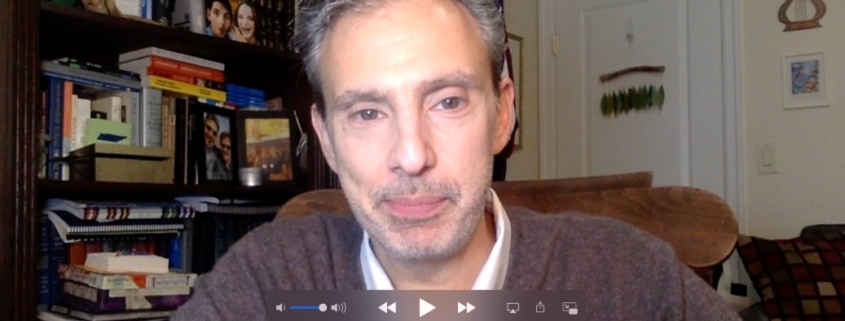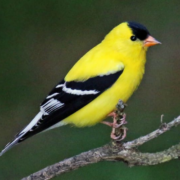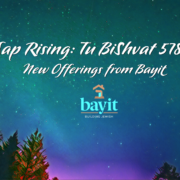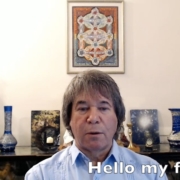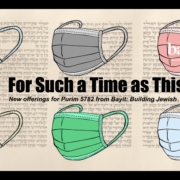Palabras del Torá / a “vort” of Torah by R’ David Markus
Each month Bayit offers regular video “vorts” (words of Torah / teachings from Jewish tradition) offered in or translated into Spanish, designed for Cuban Jewish communities and available to Spanish-speaking Jews everywhere. This month’s video offering features a teaching from Rabbi David Markus. The text follows the video, in Spanish and then in English. Deepest thanks to Rabbi Juan Mejia for translation.
Hola mis amigos. Desde mi corazón en Nueva York al vuestro en Cuba, envío mis bendiciones para esta sagrada temporada de “lo que viene después”.
“Lo que viene después” es nuestra eterna pregunta humana y también es nuestra pregunta espiritual para este mes. Es una pregunta sagrada no porque este mes contenga fiestas sagradas, sino justamente por la razón contraria.
En nuestro calendario laico, es noviembre. Escasamente puedo creer que ha sido un año entero desde mi visita a Cuba. Aún un año después siento cuán viva se sentía Cuba en Noviembre comparado con Nueva York. El poeta británico Thomas Hood escribió que todas las cosas más bellas terminan en noviembre.
Sin calor, ni alegría, ni saludable facilidad,
Sin sensación cómodo en ningún miembro-
Sin sombra, sin brillo, sin mariposas ni abejas,
Sin frutas, sin flores, sin hojas, sin aves,
Noviembre!
Pero no en Cuba. Y no sólo por el clima. Especialmente en medio de la dificultad, la comunidad judía de Cuba compartió su tesón, su pasión, su espíritu de bienvenida y su propio ser. Nos fuimos cambiados para siempre. Parte de nuestros corazones todavía está con ustedes, especialmente ahora en medio de la adversidad que azota a gran parte del mundo.
Así que es especialmente significativo que este noviembre comience en el medio del mes judío de Jeshvan. Jeshván es nuestro único mes sin fiestas- sin tiempo sagrado dedicado a nuestros rituales, reuniones, devoción, orgullo, alegría, dolor, ansia y aprendizaje. Después del intenso mes judío de Tishré, lleno de fiestas como Rosh Hashaná, Yom Kippur, Sukkot y más, súbitamente ya no hay más.
A veces la sabiduría más grande del judaísmo es sutil: el judaísmo nos enseña no sólo a través de las grandes fiestas y proclamaciones sino también a través de lo que el profeta Elías experimentó como la “tranquila voz susurrante” de nuestro interior.
Igualmente con Jeshván. Un mes entero con una súbita ausencia de fiestas judías nos enseña que la vida judía no gravita alrededor de las fiestas. Más bien, la vida judía tiene que ver con nuestro día a día, la rutina aparente con la que interactuamos los unos con los otros. El judaísmo gravita alrededor de nuestra devoción, orgullo, alegría, dolor, ansia y aprendizaje a través de todo nuestra vida, y no sólo en ocasiones especiales.
Sí, las ocasiones especiales son jusatmente eso: especiales. Son oportunidades especiales para reunirnos y celebrar, especialmente cuando el esfuerzo implicado en reunirnos es física y económicamente desafiante.
En contraste, Jeshván centra nuestra atención en el judaísmo y las mitzvot (mandamientos) de la vida judía en el resto del tiempo, ya que no vivimos sólo para las fiestas. En efecto, vivimos todos los días. Vivimos para nuestras familias y amigos, para tener oportunidades de aprender, para tratarnos bien los unos a los otros, para buscar y encontrar gratitud por nuestras bendiciones así sean pequeñas, para la alegría de celebrar shabbat cada semana. Buscamos y, a veces, incluso encontramos lo sagrado en nuestras vidas cotidianas.
Tal vez ese sea el secreto judío para sobrevivir y prosperar a través de los siglos. Nuestro secreto está en nuestras fiestas compartidas, pero más aún en vivir nuestra identidad orgullosamente, nuestra misión y nuestro credo todos los días. Que este Jeshván, el mes sin fiestas judías, nos recuerde que el amor, la alegría y el sentido de nuestra vida judía nos aguarda en cada día, en cada alma, en cada lugar y en cada momento.
Hello, my friends. From my heart in New York to yours across Cuba, I send blessings for this sacred season of “what comes next.”
No warmth, no cheerfulness, no healthful ease,
No comfortable feel in any member—
No shade, no shine, no butterflies, no bees,
No fruits, no flowers, no leaves, no birds,
November!


